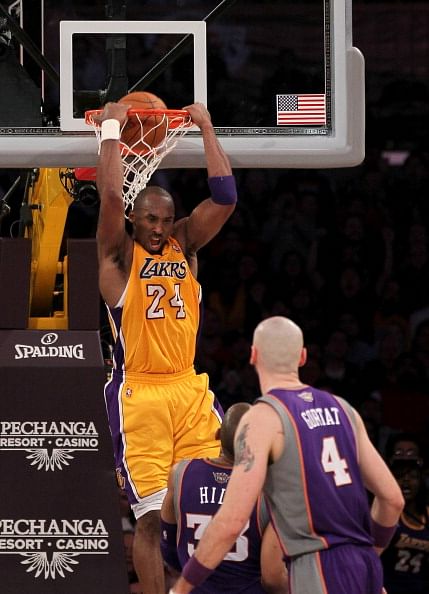
Kobe Bryant: the man and the mirage
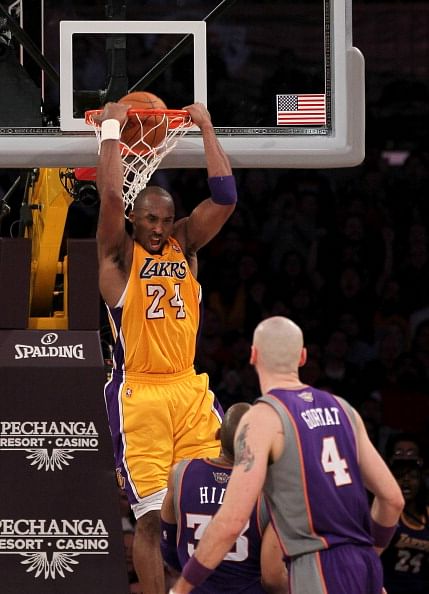 Number six. Kobe Bryant and his delirious fans worldwide can associate only one thing with that number. It’s what Kobe Bryant needs to be equal to Him in the category that really counts, the category legacies are defined by. It’s been a long time coming, this frontier that Kobe Bryant knew he had to conquer. He has always had a sense of occasion; “a student of the game” is how he describes himself most often. That, and ‘winner’ – the inexplicable something in his veins, is what led him to launch four shots as a rookie in the final minutes of an elimination playoff game for the Lakers way back in 1997. Michael Jordan would have taken those shots. After all, Kobe Bryant had styled his entire game – down to his gait – after Michael Jordan, the greatest basketball player ever.
Number six. Kobe Bryant and his delirious fans worldwide can associate only one thing with that number. It’s what Kobe Bryant needs to be equal to Him in the category that really counts, the category legacies are defined by. It’s been a long time coming, this frontier that Kobe Bryant knew he had to conquer. He has always had a sense of occasion; “a student of the game” is how he describes himself most often. That, and ‘winner’ – the inexplicable something in his veins, is what led him to launch four shots as a rookie in the final minutes of an elimination playoff game for the Lakers way back in 1997. Michael Jordan would have taken those shots. After all, Kobe Bryant had styled his entire game – down to his gait – after Michael Jordan, the greatest basketball player ever.
Ring number six matters to Kobe the same way ring number five did. Minutes after winning the 2010 NBA championship, Kobe had a few words for the journalists in the locker room: “I just got one more than Shaq”, he said, knowing that Shaq would be listening. In the jubilation and champagne fuelled excesses of a team locker room after winning the NBA gold, there was only one small, petty thing on Kobe’s mind. After 2010, the path to his legacy became clear; number six and equal footing with MJ. Only thing is, Kobe Bryant is chasing the wrong legacy.
A Champion Speaks
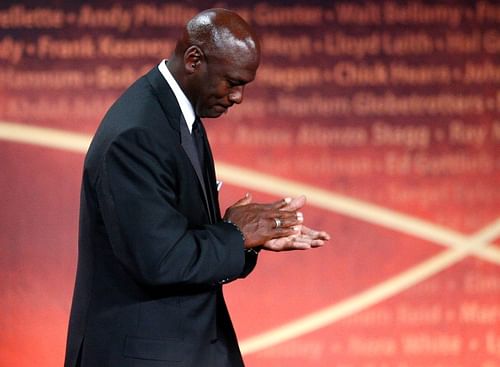
On September 11th, 2009, in Springfield, Massachusetts, Michael Jordan was enshrined in the Naismith Memorial Hall of Fame. As he is called to the stage, the TV camera pans to an applauding Kobe Bryant, in shades and sports jacket, a cap covering most of his face. He sits quickly, his face passive and unreadable in the few moments caught on camera. As Jordan goes up to the podium, the applause continues – rightfully, given his basketball achievements – and Jordan starts to cry, causing every basketball lover watching to tear up as well. It was a moment of great occasion.
And then, over the next 20 minutes, Jordan described, in great detail, every perceived slight, every question asked of him, every doubter, and every moment in his basketball career that ‘motivated’ him. He snubbed his high school coach, former teammates at college, his college coach, a dozen NBA Hall of Famers including Isiah Thomas, Pat Riley, Larry Bird, Doug Collins…even Chicago Bulls owner Jerry Reinsdorf, all of whom were in attendance, a smile frozen on each face. Jordan made clear what motivated him – the Media that had always doubted his ability to match the stature of Bird and Magic:
“I had to listen to all that, and that put so much wood on that fire that it kept me each and every day trying to get better as a basketball player.”
By the end of it, his speech had exactly six thank-yous. The greatest basketball player had just six people to thank for helping him get there. On the other hand, there were at least two dozen people whom he questioned, embarrassed, and cast aside in those 20 minutes of ‘enshrinement’. “My name is Michael Jordan, king of kings”, he seemed to be saying, “look upon my works, ye mighty and despair!”
Michael Jordan’s legacy, the speech made clear, was not simply one legacy. We speak of a player’s legacy as if it was a singular, monolithic thing that is irreducible when in fact a legacy is in the plural, many legacies, things that contribute together to the effects of a man upon the rest of his environment. Just like Ozymandias, just like Charles Foster Kane, Michael Jordan did not perhaps realize this. There are whispers that have grown to murmurs of Jordan’s megalomania; Larry Brown (the HOFer Jordan fired as owner of the Bobcats) was only the latest to open a can of worms that is opened every once in a while before being hastily shut to protect His ‘legacy’. Brown asserted that Jordan surrounded himself with sycophants in running the Charlotte Bobcats, guys who “were like spies wondering what we were doing and getting back to him.”
There is Steve Kerr, the guy who won Jordan one championship (at least), who waited 23 minutes for a thank you that night in Springfield and never got it. Michael Jordan’s on-court legacy is of a class unparalleled. But as a teammate, as a colleague, as a mentor, Michael Jordan’s legacy is even shorter than an eight year old’s shadow at noon. ESPN’s Rick Reilly documents Jordan’s need to crush his competitors; he writes of watching first-hand Jordan break Rodney McCray in after-practice shooting games, humiliating him. McCray played just one season for the Chicago Bulls. It was his last NBA season.
‘If you want to know what a man is like, see how he treats his inferiors’
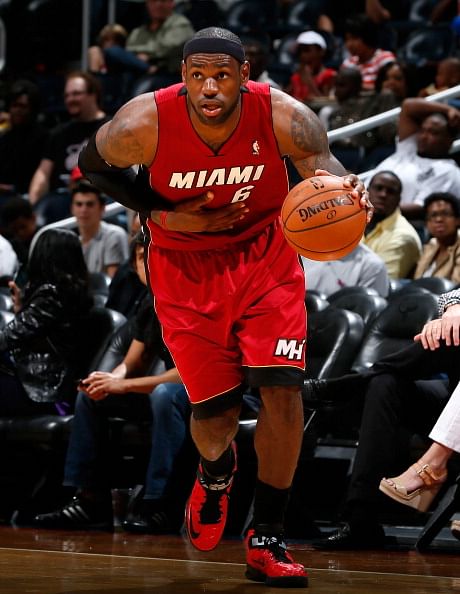 Kobe Bryant too has a left a trail of bitter teammates, bizarre off-court incidents and confused basketball professionals in his path to being a ‘winner’. Kobe and Shaq so bitterly hated each other that Kobe decided a one-man team was enough for him, events that led to a 2004 trade where Shaq found a new home in South Beach. It took four years for maturity to set it. For him to realize he couldn’t do it alone. Smush Parker – whose basketball ability Bryant recently dismissed with derision – is only one teammate amongst several in the NBA who have been unhappy with Bryant’s attitude to them. Again, these voices remain whispers because Kobe is the biggest international basketball brand not named – guess who – Michael Jordan. It’s taken a while, but Kobe’s finally in the basketball community’s good books after his ugly sexual harassment affair in 2003-04. Both Kobe and Michael are unquestionably the international faces of the NBA; they are synonymous with ‘winning’. Their on-court legacies are untouchable. But their contributions to basketball on the whole? What do we factor into that estimate? Team chemistry? Colleague opinions? His coaches? His respect for the community of which he is only one part? In other words, is Kobe Bryant’s legacy one towards basketball as such or simply, just, winning?
Kobe Bryant too has a left a trail of bitter teammates, bizarre off-court incidents and confused basketball professionals in his path to being a ‘winner’. Kobe and Shaq so bitterly hated each other that Kobe decided a one-man team was enough for him, events that led to a 2004 trade where Shaq found a new home in South Beach. It took four years for maturity to set it. For him to realize he couldn’t do it alone. Smush Parker – whose basketball ability Bryant recently dismissed with derision – is only one teammate amongst several in the NBA who have been unhappy with Bryant’s attitude to them. Again, these voices remain whispers because Kobe is the biggest international basketball brand not named – guess who – Michael Jordan. It’s taken a while, but Kobe’s finally in the basketball community’s good books after his ugly sexual harassment affair in 2003-04. Both Kobe and Michael are unquestionably the international faces of the NBA; they are synonymous with ‘winning’. Their on-court legacies are untouchable. But their contributions to basketball on the whole? What do we factor into that estimate? Team chemistry? Colleague opinions? His coaches? His respect for the community of which he is only one part? In other words, is Kobe Bryant’s legacy one towards basketball as such or simply, just, winning?
When LeBron James – he who is often derided for not being “enough of a competitor” – decided to team up with his colleagues, the basketball universe exploded and unanimously condemned him for it. LeBron respects his colleagues in a way that Kobe Bryant never has. Bryant could never co-exist on a team with Dwyane Wade, an alpha-male who couldn’t accept being ranked #3 in the NBA by ESPN last year. Notice how the LeBron-or-Wade narrative simply fizzled out? Both superstars refused to be baited by the media, and only spoke of their admiration for each other. In fact, LeBron shares such good chemistry with his teammates that Zydrunas Ilgauskas, his long-time teammate with the Cavs, followed him to Miami hoping to win a ring. Players like playing with guys like Bron and Wade in a way that Kobe has simply never understood. Bryant is more of a ‘winner’ and a ‘competitor’ than either of them, but he hardly contributes more to the collective basketball endeavor than either of them. Kobe leads by example and looks down with disdain upon those he considers inferior; Wade took less money than both Bosh and Bron in 2010 to ensure his long time teammate Udonis Haslem stayed with the Heat. The relationship they share on court is of fiercely loyalty; against the Pacers, Haslem flagrant-fouled a player in retaliation for what he believed was an overly physical foul on Wade.
Showtime, Again
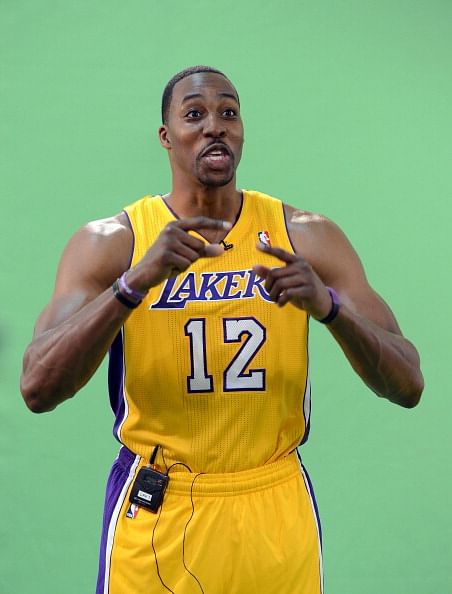 For the first time in a decade, Kobe Bryant is not the best player on his own team. Dwight Howard is the future for the Lakers, and the most essential part of its present as well. If Kobe is truly a student of the game, he understands this. And perhaps, at the end of his amazingly long career, Kobe has an opportunity to change his legacy. To create a new one; the legacy he leaves behind with his teammates, staff, people around him; the ‘small guys’, the relationships that will outlast his career and always dwarf his ‘winner’ persona and basketball achievements. Numbers and highlights are just once the curtain falls, merely notations and archive video. The Smush Parkers of his career will be the relationships that might matter more than missed three-pointers.
For the first time in a decade, Kobe Bryant is not the best player on his own team. Dwight Howard is the future for the Lakers, and the most essential part of its present as well. If Kobe is truly a student of the game, he understands this. And perhaps, at the end of his amazingly long career, Kobe has an opportunity to change his legacy. To create a new one; the legacy he leaves behind with his teammates, staff, people around him; the ‘small guys’, the relationships that will outlast his career and always dwarf his ‘winner’ persona and basketball achievements. Numbers and highlights are just once the curtain falls, merely notations and archive video. The Smush Parkers of his career will be the relationships that might matter more than missed three-pointers.
For the Los Angeles Lakers to succeed, Kobe Bryant cannot afford to compete with his own team. Dwight Howard appears to be as fragile an ego as Bryant has ever been confronted with. Bryant’s relationship with Howard (which is why Howard was reluctant to go to LA initially) might be what makes or breaks the Lakers next season. Perhaps Bryant will change and understand that maybe, just maybe winning isn’t everything. Charles Kane, after all, died lonely and unhappy in a huge mansion, having everything and yet, strangely, nothing. But it isn’t likely. In a recent post on Facebook, Bryant had this to say:
“I’d rather be perceived as a winner than a good teammate. I wish they both went hand in hand all the time but that’s just not reality. I have nothing in common with lazy people who blame others for their lack of success. Great things come from hard work and perseverance. No excuses.”
‘There’s no ‘I’ in ‘team’, a journalist quipped after a Chicago win in which Jordan scored a bucketload of points; “but there is one in win,” Jordan retorted. They say that this will to win is what makes Jordan and Bryant who they are. But hey, Tim Duncan is a great player too, right? Duncan’s legacy transcends winning; his legacy is a holistic contribution to basketball. His Hall of Fame enshrinement speech is likely to be like his career; short, boring, full of thank-yous and yet wholly effective. Kobe was there that night in 2009 at Springfield, trying hard to remain impassive. As his career comes to an end, he has a chance to finally rise out of Jordan’s shadow, be different from him. Be a better teammate, a better mentor, a better friend. The real question is not whether Kobe will get his sixth ring. It’s how he will get it. How many thank-yous will Kobe have in his speech? More importantly, how many players will thank him in theirs?